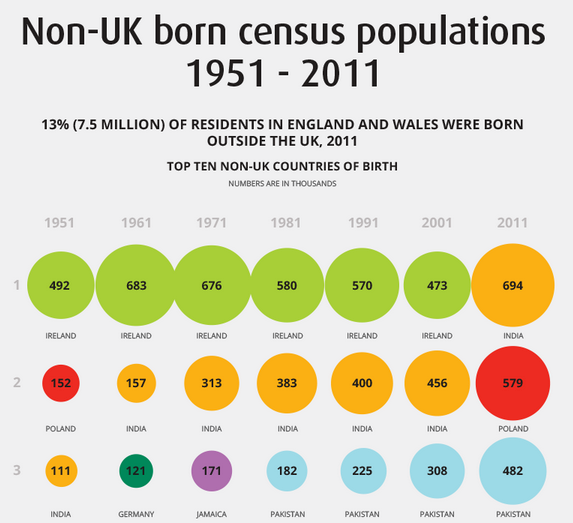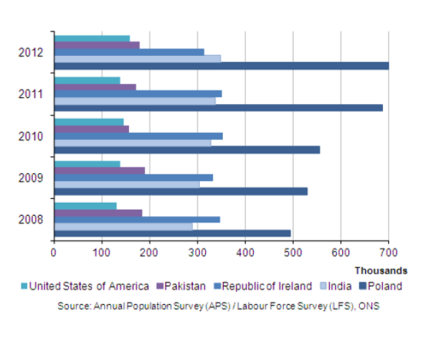In this post, originally published on Immigration and Services, Ajmeri Walele looks at the facts around immigration.

Since 1945, immigration in the United Kingdom has increased, in particular from the Republic of Ireland, but also from former colonies of the British Empire such as India, Pakistan, Bangladesh, South Africa, Hong Kong and the Caribbean.
The latest data (PDF), gathered in December 2012, shows:
- Around 13% of the British population is now made up of immigrants – but the British public thinks the figure is 31%.
- 7.7 million of UK residents are born abroad; of those: just under two-thirds came from outside the EU, and a third from within the EU

- The most common non-UK country of birth for UK residents was India, with 729,000 residents born there.

- The most common non-British nationality in the UK was Polish, with 700,000 Polish nationals.

1) Why do people migrate to the UK?
According to a report (PDF) published in 2007 by The London School of Economics and Political Science, the majority of people who move to the UK do so “for work, refuge, stimulus, profit, personal development and pleasure”.
They believe the United Kingdom can offer themselves, and their families, better education, healthcare, and work opportunities.
2) Where do they live?

In 2011 The Guardian visualised the number, in thousands, of non-UK born residents in different regions for the top five countries of birth in each area.
The chart shows that people from different countries often go to different parts of the country: In London and the East Midlands those born outside the UK are most likely to have been born in India, but in the West Midlands and Yorkshire Pakistan is the top country of origin.
There are more Poles than any other non-UK nationality in Wales, Scotland, and the South West, while those born in South Africa are second only to those from India in the South East, and German-born nationals come second in the North East and South West.
3) Are foreign nationals ‘taking’ our jobs?
In November 2013, The Telegraph reported that a government-backed study found one in five jobs in ‘key industries’ in engineering were being filled by migrants, due to an apparent lack of skilled British individuals searching for employment.
The report also refers to figures from the Office for National Statistics which showed that the number of foreign nationals finding jobs in the UK had increased by 225,000 to 4.26 million in a year, compared to a rise of just 192,000 British-born workers. (Although the article does not link to the ONS figures, we found them here).
Temporary work restrictions on Romanian and Bulgarian migrants have been lifted as of 1st January 2014. One Daily Mail report claimed flights and coaches from the region to the UK were sold out, but a systematic investigation by medical reporter Jon Danzig found no evidence for the claims, with many of those quoted in the articles having no memory of having spoken to the newspaper:
“Balkan Horn deny any knowledge of ever talking with the Daily Mail, and say they would never have given such a quote as it wouldn’t have been true; there were seats available on their buses to London, and no increased demand because of the change in EU rules. In fact, demand for bus journeys to England had gone down.”
The Office for National Statistics says it will have its first figures on the impact of the lifting in May 2014.
4) Are foreign nationals working the same jobs for lower pay than British nationals?
The minimum wage in the United Kingdom is currently £6.31 per hour for over-21s.
Although it is illegal for employers to pay less than the minimum wage in most circumstances, there have been cases reported by the BBC where foreign nationals are paid much less for their labour.
However, it is not clear how those numbers compare to companies breaking minimum wage laws more generally: in 2012 HM Revenues and Customs (HMRC) launched 1,400 investigations into employers accused of not paying the minimum wage, and recently the penalties were significantly increased after criticism that the system was not effective.
5) Can immigrants claim welfare benefits whilst living in the UK?
If immigrants have a residence permit which allows them to live in the UK, it may include the condition that they are unable to claim most public funds such as benefits, tax credits and housing assistance.
However, there are exceptions to this condition and, with a call to HM Revenues and Customs, immigrants can receive advice on which benefits they are entitled to claim and how.
Mayor of London Boris Johnson has called for a two year gap between the arrival of immigrants and the time when they can start claiming welfare benefits.
This is an excellent article, thank you very much.